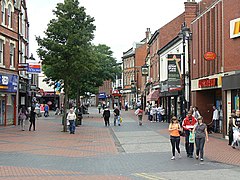Bulwell, Nottinghamshire
| Bulwell | |
|---|---|
 Main Street, Bulwell in 2009 |
|
| Bulwell shown within Nottinghamshire | |
| Population | 16,157 (ward. 2011) |
| OS grid reference | SK539451 |
| District | |
| Shire county | |
| Region | |
| Country | England |
| Sovereign state | United Kingdom |
| Post town | Nottingham |
| Postcode district | NG6 |
| Dialling code | 0115 |
| Police | Nottinghamshire |
| Fire | Nottinghamshire |
| Ambulance | East Midlands |
| EU Parliament | East Midlands |
| UK Parliament | |
Bulwell is an English market town about 4.5 miles (7 km) northwest of Nottingham city centre, on the northern edge of the city. The United Kingdom Census 2001 showed there were almost 30,000 people living in the Bulwell area, accounting for over 10% of the population of the city of Nottingham. The 2011 census showed a population of 16,157 in the Bulwell ward of Nottingham City Council. There is also an adjacent ward called Bulwell Forest. The population of this ward at the same census was 13,614.
The home land of Francis Needham. The earliest documented settlements in Bulwell appeared circa 800 A.D, and were most likely built around the same time as the first local bridge spanning across the River Leen. With the river being significantly narrower, shallower and slower-moving in Bulwell than in other potential locations along its length and the threat of highwaymen a very real danger on existing cross-country routes, a toll bridge was constructed in this outpost, allowing for a quicker and safer passage from north to south for travellers but providing an obstacle to less legitimate travellers.
The bridge created a rare direct road to Nottingham from the northwest and therefore introduced regular traffic from across the country to the area for the first time.
The tolls levied for crossing the new bridge required the building of a gatehouse for those collecting the levies and providing protection for people using the route: the creation of the toll house thereby inadvertently founding the new settlement. The almost captive market of the travelling parties provided endless potential for trade, and the abundance of natural resources made it easy to erect a dwelling. As the volume of traffic using the road increased, so did the size and population of Bulwell.
Bulwell is mentioned in the Domesday Book, which was compiled in 1086. [2] Recorded in the book as "Buleuuelle" and classified as a village, Bulwell had by this time become established as a small trading post for all kinds of goods and services. It had expanded to cater both for those living and working in the surrounding area and those travelling further afield, and this in itself encouraged many others to settle in the wider area.
...
Wikipedia

